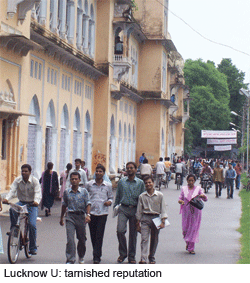The glory days of the 90-year-old Lucknow University (LU, estb. 1920), the alma mater of some of the big success stories of post-independence India — former President Shankar Dayal Sharma, journalist Vinod Mehta, cardiologist Dr. Naresh Trehan and scientist Birbal Sahni — seem to be over. Plagued by continuous and incremental government interference, surly student associations, faculty appointment scandals, and chronic financial stringency, this vintage varsity is caught in a tailspin.
On October 21, Prof. Neeraj Kumar of LU’s business management faculty was demoted to the post of reader after an internal inquiry found him guilty of plagiarism. According to a three-strong enquiry committee chaired by Dr. K.C. Gupta, director of the Indian Institute of Toxicology Research, Kumar was found guilty of having blatantly passed off a research paper authored by Harvard Business School’s Dr. Abraham Zaleznik, on the basis of which he was appointed professor in 2012. But despite the gravity of the offence, he was given a mere slap on the wrist and demoted.
However reacting to the scandal, LU vice chancellor S.B. Nimse has directed that titles of all doctorate dissertations be uploaded on the university’s website together with the abstracts of theses submitted during the past six months. “This will enable the vice chancellor’s office to monitor the number of Ph D scholars and the subject matter of their theses,” explains Roop Rekha Verma, former vice chancellor of the university.
 According to LU insiders, the recent business management faculty scandal is only the tip of a huge iceberg because Ph Ds are awarded too liberally. “It’s not unusual for 75-100 postgrad research students to write their Ph D dissertations guided by one professor. This has led to a steep downfall in the quality of research papers with guide-professors casually approving Ph D dissertations. The practice has badly tarnished LU’s reputation about which a succession of vice chancellors seem to be unconcerned,” says a senior lecturer, who requested anonymity.
According to LU insiders, the recent business management faculty scandal is only the tip of a huge iceberg because Ph Ds are awarded too liberally. “It’s not unusual for 75-100 postgrad research students to write their Ph D dissertations guided by one professor. This has led to a steep downfall in the quality of research papers with guide-professors casually approving Ph D dissertations. The practice has badly tarnished LU’s reputation about which a succession of vice chancellors seem to be unconcerned,” says a senior lecturer, who requested anonymity.
If the number and quality of research papers and Ph D dissertations in Lucknow University and higher education institutions countrywide are plunging (India’s internationally published science research papers in 2011 were a mere 39,640 cf. China’s 142,645 and 310,206 published in the US), the Delhi-based University Grants Commission (UGC), which accredits and monitors all non-technical faculties, colleges and universities countrywide, is also blameworthy.
The UGC’s guidelines clearly state that “following completion of evaluation process and announcement of the award of M.Phil/Ph Ds, the awarding university shall submit a soft copy of the theses to UGC within 30 days, for hosting the same on INFLIBNET, accessible to all universities and institutions”. Moreover the UGC guidelines add that while awarding Ph Ds, “the university shall issue a provisional certificate, certifying that the degree has been awarded in accordance with the regulations of the UGC”. Quite obviously UGC has also failed to scrutinise and investigate the thesis dissertations posted, even randomly.
Institutional laxity about dealing firmly with faculty — lecturers and professors who should be role models of students — is to a substantial extent the cause of spreading rot and plunging academic standards in Lucknow University. In 2010, R.C. Tripathi, a Hindi language lecturer, was promoted to head the faculty of journalism and mass communications on the basis of a postgraduate degree which was found to be fake. The ‘punishment’ imposed on Tripathi was cancellation of his promotion and reversion to his parent faculty. “The university administration is too lenient about punishing erring and dishonest faculty. This is one of the major impediments to our growth and development,” admits a senior LU professor.
The weak administration of LU is intimately connected with the tumultuous politics of India’s most populous (200 million) state. Successive caste-combination governments of the Bahujan Samaj Party (BSP) and the incumbent Samajwadi Party (SP), which fund LU (annual grant: Rs.32 crore), have been tampering with the faculty recruitment process to appoint kith and kin to well-paid faculty positions from where it’s impossible to dislodge them given the high-level protection they enjoy. There’s the rub.
Apoorv Srivastava (Lucknow)























